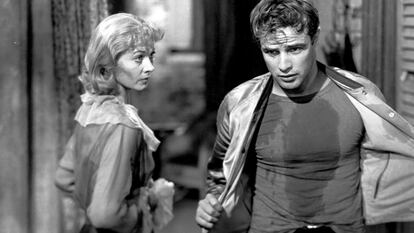When cinema swelters
Heat serves various purposes in films. It can be a sign of eroticism, a cause of weariness or the creator of oppressive atmospheres

The following quote may not be literal—Google has replaced the dispensable exercise of memory, but even though mine is old and ailing, it still works—and I seem to remember that Albert Camus wrote in the opening pages of The Stranger: “I killed a man I didn’t know on a beach in Oran because it was hot.” The damn heat can cause such tragedies! The madness, depression and nerves that heat induces know no bounds; everything is paralyzed by a swelter that punishes both body and soul. Some films drip with heat, in which it provokes events and behaviors, it is palpable and becomes the main character.
Eroticism and heat are closely related in cinema. There are few films as sensual, twisted and volcanic as the excellent Body Heat. In the movie, Kathleen Turner becomes the most carnal, manipulative, perverse goddess. Poor William Hurt. He will meet a tragic fate. But just let them try to take away his memories. During his life sentence, he will regret the deception, but he will surely remain aroused by the torrid and eternal sex he had with the devilish woman. In The Seven Year Itch, we saw the legs and panties of that fascinating and explosive creature called Marilyn Monroe, thanks to her unquenchable need to refresh herself with the air coming from the subway. And discerning women of any time and place will desire and yearn for the sweat-dripping, T-shirt-wearing Marlon Brando who inconsolably cries out “Stella!” in A Streetcar Named Desire; the same goes for the desirable, alcoholic, disdainful Paul Newman (who is pursued by none other than Mrs. Liz Taylor) in Cat on a Hot Tin Roof.
But let’s talk about heat’s role in epics. David Lean used it in Lawrence of Arabia’s most impressive scene, which takes place in the Wadi Rum desert. Lawrence leaves himself vulnerable to being roasted by the sun in his effort to pick up his servant who got lost in the night, defying the Arab army’s unwavering faith that fate is already written by Allah. And it’s all sweat in The Bridge on the River Kwai, even if the phlegmatic and obstinate tortured English colonel—played by the masterful Alec Guinness—insists that he is unaffected by it. And the executioner Willard says that everything smelled of fever and decomposition in the jungle lair where Colonel Kurtz lives. It happens in Apocalypse Now, in the heart of darkness, with the man with a shaved head whispering “the horror, the horror...” like a sleepwalker.
Then there’s Rear Window, where James Stewart was wheelchair-bound; he’s pampered by Grace Kelly and bored out of his wits, and he lacks air conditioning in the sweltering New York summer. What to do? Well, he shamelessly decides to observe the lives of his neighbors across the street. And then what happens, happens. There are also extraordinary film noir movies in which everyone is even more disturbed by the heat, as in Touch of Evil and Chinatown. And how could you not feel that everything is burning both inside and out in Westerns? One of my favorites is The Professionals in which Burt Lancaster and Jack Palance are facing death in a Mexican desert; one is badly wounded, and both are beaten down by the sun. They tell each other things like this: “La Revolución [revolution] is like a great love affair. In the beginning, she is a goddess. A holy cause. But... every love affair has a terrible enemy: time. We see her as she is. La Revolución is not a goddess but a whore. She was never pure, never saintly, never perfect. And we run away, find another lover, another cause. Quick, sordid affairs. Lust, but no love. Passion, but no compassion. Without love, without a cause, we are... *nothing*! We stay because we believe. We leave because we are disillusioned. We come back because we are lost. We die because we are committed.” Every time I hear or remember that scene, I get a lump in my throat.
Sign up for our weekly newsletter to get more English-language news coverage from EL PAÍS USA Edition
Tu suscripción se está usando en otro dispositivo
¿Quieres añadir otro usuario a tu suscripción?
Si continúas leyendo en este dispositivo, no se podrá leer en el otro.
FlechaTu suscripción se está usando en otro dispositivo y solo puedes acceder a EL PAÍS desde un dispositivo a la vez.
Si quieres compartir tu cuenta, cambia tu suscripción a la modalidad Premium, así podrás añadir otro usuario. Cada uno accederá con su propia cuenta de email, lo que os permitirá personalizar vuestra experiencia en EL PAÍS.
¿Tienes una suscripción de empresa? Accede aquí para contratar más cuentas.
En el caso de no saber quién está usando tu cuenta, te recomendamos cambiar tu contraseña aquí.
Si decides continuar compartiendo tu cuenta, este mensaje se mostrará en tu dispositivo y en el de la otra persona que está usando tu cuenta de forma indefinida, afectando a tu experiencia de lectura. Puedes consultar aquí los términos y condiciones de la suscripción digital.









































